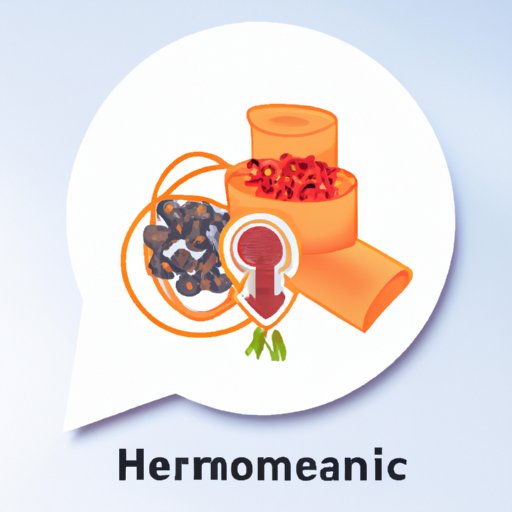
I. Introduction
Hemorrhoids can be quite a nuisance, and it’s not uncommon for people with this condition to experience constipation. Dealing with constipation can be frustrating, especially if it’s associated with hemorrhoids. This article aims to provide readers with practical tips and remedies for managing constipation caused by hemorrhoids
II. Understanding Causes and Symptoms of Hemorrhoids
Before delving into how to manage constipation associated with hemorrhoids, it’s essential to have an understanding of what hemorrhoids are and what their symptoms are.
A. Definition of Hemorrhoids
Hemorrhoids are swollen veins in the anal canal or around the rectum. They can occur internally or externally, and their sizes can vary.
B. Causes of Hemorrhoids
Hemorrhoids can be caused by many factors, including pregnancy, straining during bowel movements, chronic constipation, and prolonged sitting.
C. Symptoms of Hemorrhoids
The symptoms of hemorrhoids can vary depending on their location, but common symptoms include itching and irritation around the anus, pain during bowel movements, and bleeding.
III. Common Remedies for Constipation Associated with Hemorrhoids
There are several over-the-counter options available to alleviate constipation related to hemorrhoids.
A. Over-the-counter Medications
Stool softeners and laxatives can be taken to ease constipation associated with hemorrhoids. It’s essential to follow the recommended doses and consult a medical practitioner before taking any medication.
B. Topical Creams and Ointments
Topical creams and ointments containing anti-inflammatory ingredients can be applied to alleviate discomfort or irritation around the anus.
C. Suppositories
Suppositories may also be recommended to help soften stools and alleviate constipation caused by hemorrhoids.
IV. Lifestyle Changes and Diet Recommendations for Managing Hemorrhoids
Adopting healthy habits and making dietary changes is crucial in managing constipation caused by hemorrhoids
A. Dietary Changes
Eating more fiber-rich foods such as fruits, vegetables, and whole grains can alleviate constipation and aid bowel movements. Fried or spicy foods and dairy products can cause constipation and should be avoided.
B. Fluid Intake Recommendations
Dehydration can be a contributing factor to constipation, so drinking plenty of water and other fluids can help alleviate it. Avoid caffeinated or alcoholic beverages as they can be dehydrating.
C. Managing Bowel Movements
Avoid straining during bowel movements as this can cause irritation and inflammation. Try using a stool softener or a natural laxative, such as prunes, to encourage bowel movement.
V. Exercise and Pressure-Relieving Activities to Help Bowel Movement
Regular exercise and pressure-relieving activities can help alleviate the symptoms of hemorrhoids and encourage bowel movement.
A. Strengthening Exercises for Reducing Hemorrhoid Symptoms
Exercises such as Kegels and squats can help strengthen the muscles in the pelvic area, supporting proper bowel movement function.
B. Pressure-relieving Activities
Avoid prolonged sitting and try to take breaks to stretch, walk or move around. This helps relieve pressure and improve blood flow in the rectal area.
C. Yoga and Meditation Techniques to Relieve Stress and Chronic constipation
Stress can contribute to constipation. Try practicing relaxation techniques such as yoga or meditation to relieve stress and promote regular bowel movements.
VI. Non-Invasive Home Remedies for Soothing and Relieving Hemorrhoid Discomforts
There are several non-invasive home remedies that can help alleviate the symptoms of hemorrhoids, including constipation.
A. Warm Baths
Soaking in a warm bath can help soothe the discomfort caused by hemorrhoids. Adding Epsom salt to the water can also help alleviate inflammation.
B. Putting ice packs to Reduce Inflammation
By applying an ice pack to the affected area, inflammation around the anus can be reduced, providing relief from hemorrhoid symptoms.
C. Vinegar Soaks to Calm Irritation
Mixing apple cider vinegar with water and using it as a soak for the anus can help reduce inflammation and relieve irritation.
VII. When to See a Doctor and What Treatment Options Are Available
Not all cases of hemorrhoids require medical attention, but if symptoms persist despite self-care efforts, it’s essential to seek medical help. In some cases, hemorrhoid surgery may be necessary to manage hemorrhoids
A. Understanding Severe Hemorrhoid Symptoms
Consult a physician if you experience excessive bleeding, persistent pain, or a lump around the anus.
B. Medical Treatments Available
Medical treatments for hemorrhoids include prescription medications, such as corticosteroids, or minimally invasive procedures such as rubber band ligation, the most commonly recommended treatment option.
C. Surgery Options
Surgery may be necessary if less invasive treatments do not alleviate the symptoms. Procedures such as hemorrhoidectomy or stapled hemorrhoidopexy are available for chronic or severe cases of hemorrhoids.
VIII. Conclusion
Dealing with constipation due to hemorrhoids can be frustrating and uncomfortable, but self-care measures and medical treatments can help alleviate the symptoms. Adopting healthy habits, managing bowel movements, and using non-invasive home remedies can provide relief. Nevertheless, if symptoms persist and become severe, it’s essential to seek medical attention to get the proper treatment that suits your specific case.
Remember that prevention is better than cure, and it’s essential to adopt healthy habits and manage stress to prevent developing hemorrhoids in the future.





